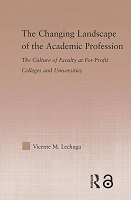The Changing Landscape of the Academic Profession
Proposal review
Abstract
The rapid success of for-profit colleges and universities (FPCUs) only recently has caught the attention of scholars in academe. The continuing expansion of the proprietary higher education sector has lead to fundamental questions regarding the purpose and function of FPCUs. As new technologies continue to emerge, education is becoming of increasing import to employees seeking to upgrade their skills and employers in search of individuals who possess the necessary expertise and training to help their organizations succeed. For-profit institutions challenge traditional notions of the academy--such as shared governance, tenure, and academic freedom--by utilizing administrative practices that more aptly apply to the corporate arena. Moreover, they exclusively employ non-tenure-track faculty members. This study provides a framework for understanding faculty roles and responsibilities at for profit colleges and universities. The author employs a series of in-depth interviews with 53 faculty members, from four for-profit institutions. Utilizing a cultural framework, the study explores the attitudes, beliefs, and perceptions of faculty work with particular consideration given to faculty member's non-tenure-track status, participation in decision-making activities, and academic freedom. The study examines the culture of the faculty work by asking how the profit-seeking nature of the institution affects their efforts inside and outside of the classroom. The author introduces a new component to the cultural framework that illustrates how the close ties between FPCUs and business and industry affect the nature of faculty work.
DOI
10.4324/9780203959930ISBN
9780415976992;9780415646499;9781135508609;9781135508678;9781135508746OCN
1135855388Publisher
Taylor & FrancisPublisher website
https://taylorandfrancis.com/Publication date and place
2006Classification
Education
Higher education, tertiary education
Teacher training


 Download
Download Web Shop
Web Shop